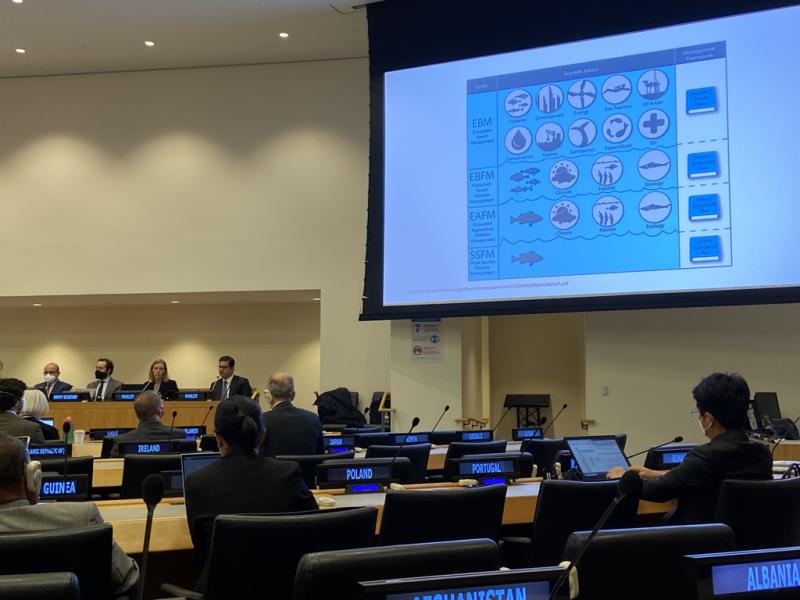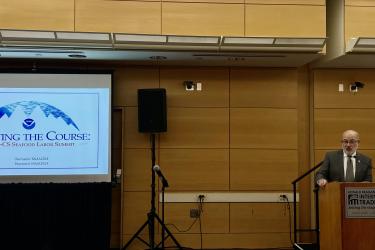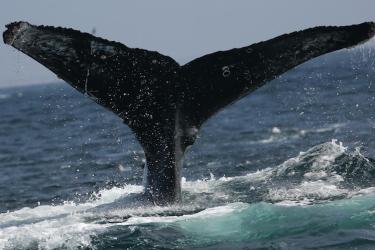At a United Nations conference in May, NOAA Fisheries discussed Ecosystem Approaches to Fisheries Management with other interested nations. The event highlighted the importance of an ecosystem approach on a global stage.
Adopting ecosystem approaches to fisheries management allows countries to address the many problems the globe is facing, such as climate change, and create a more sustainable future for our ocean.
“For the United Nations to prioritize discussing Ecosystem Approaches to Fisheries Management is not trivial. It is indicative of how important the topic has become around the world,” said Jason Link, Senior Scientist for Ecosystems at NOAA Fisheries.
The UN holds theme-based consultations annually to provide an international forum for countries across the globe to advance fisheries issues. This meeting explored how well countries are implementing Ecosystem Approaches to Fisheries Management.
This approach is codified as part of International Law, and Ecosystem-based Fisheries Management is the official policy of NOAA Fisheries. Exploring ways to effectively adopt this approach will help countries learn from each other and better implement these laws and policies.
NOAA Fisheries Leads Ecosystem Approaches to Fisheries Management
NOAA Fisheries highlighted the advances the United States has made on Ecosystem Approaches to Fisheries Management as part of the U.S. delegation. The U.S. delegation was composed of key partnerships across many facets of NOAA Fisheries, including International Affairs, Trade, and Commerce, the Northeast Fisheries Science Center, and the Senior Scientist for Ecosystems. There was also a key partnership with the Department of State, which led the delegation.
At these consultations, the UN looked to the United States as a leader in the implementation of Ecosystem Approaches to Fisheries Management. NOAA Fisheries panelists presented on progress towards Ecosystem Approaches to Fisheries Management. They provided both a national perspective and a representative case study from the Mid-Atlantic Fishery Management Council.
“I've been privileged to support the Mid-Atlantic Fishery Management Council as they developed their ecosystem approach. The tools they use—ecosystem reporting, risk assessment, conceptual modeling, and management strategy evaluation—are also used across the United States, and are adaptable to many situations,” said Sarah Gaichas, Research Fishery Biologist at the Northeast Fisheries Science Center.
Overcoming Challenges to Ecosystem Approaches
Other countries, international government organizations, non-governmental organizations, regional fisheries organizations, and related members also shared their lessons learned. This increased coordination across countries and provided a better understanding for how others have overcome the many challenges towards implementation. For example, there has been a perception that the approach requires a lot of data. Dr. Gaichas presented examples that demonstrated that relatively simple, risk-based approaches can work when engaging with key stakeholders.
Opportunities for Advancement
Scientists have documented the many benefits of ecosystem approaches to fisheries management. These include providing additional information for making decisions, and increasing the certainty about the impact of those decisions. This approach facilitates analysis of trade-offs between different stakeholder priorities, balancing social and ecological needs. It ensures that ecosystem-level measures remain stable, which could translate into better regulatory stability and business plans. Finally, it reduces the risk of overfishing or overfished populations.
This conference emphasized not only those benefits, but also ways to achieve those benefits. Countries can achieve those benefits by integrating all components of an ecosystem, including human needs and activities, into the decision-making process. This is opposed to a more traditional approach of looking at each species or component individually. It includes consideration of:
- All important fish species interactions
- Important oceanography, habitat, ecological, and economic factors
- Humans as critical components of the ecosystem
Importantly, this approach explicitly examines the tradeoffs inherent to the complex fisheries ecosystems.
The aim is to support continual progress, both nationally and internationally, in the management of our fisheries.



